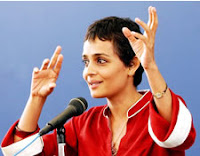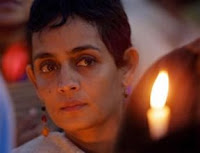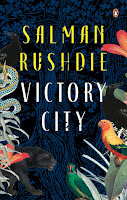Arundhati Roy
 The God of Small Things had a profound impact on me. I found it one of the most un-self-conscious pieces of writing I have ever read. It seemed like an unbroken rampant stream, almost torrent, of words flowing from the writer’s mind to paper. It remains to date one of my most referential books when it comes to writing style.
The God of Small Things had a profound impact on me. I found it one of the most un-self-conscious pieces of writing I have ever read. It seemed like an unbroken rampant stream, almost torrent, of words flowing from the writer’s mind to paper. It remains to date one of my most referential books when it comes to writing style.
A lot of water has flown under the bridge since then, of course. Arundhati Roy has not written another piece of fiction. Instead she has been in the news for her political views expressed in a series of essays and speeches. It has drawn huge criticism as well as approbation, more so because she brings her own special brand of unbridled passion to her political writing. Passion is scary to a lot of people, especially to academics and political columnists who pride themselves on objectivity and detachment (witness Ramachandra Guha’s ridiculous indictment of her in his article in The Hindu).
Arundhati Roy is not detached. She is not impartial. She writes with an agenda, a purpose. As in her novel, she sees herself on the side of the underdog, the marginalized and the dispossessed. She is one of the most recognized and vocal supporters of the NBA and a vociferous critic of big dams, globalization, Narendra Modi and what she terms the resurgence of ‘empire’ in the world. For an average middle-class Indian, even a relatively liberal one, who has prospered with the opening up of the economy, her views can seem extreme, anarchic and extremely uncomfortable.
The Shadow of the Beast is a compilation of interviews she gave to various journalists between 2001 and 2008. In them she runs the gamut of her activist views - the nature of democracy and justice in 
On the charge that her writing style is hyperbolic and takes away from the reasoned argument she is trying to create, she says delightfully, “But I insist on the right to be emotional, to be sentimental, to be passionate. If displacement, dispossession, killing and injustice…does not enrage us, what will?...The whole framework of reason versus passion is ridiculous, because often passion is based on reason…They’re not two different things. I feel it is very important to defend that. To defend the space for feelings, for emotions, for passion…I have feelings about the things I write about – and I am going to express them.” I find it heady stuff, this zealousness that comes from the absolute certainty of the need to fight injustice.
Yet the true power of her writing comes from, not so much her ardour, as much from the rigour of her intellect. She is not a flake – her arguments sound reasoned and whether she is talking about statistics and reports on displacement due to big dams or the Enron deal with the Maharashtra Government or the dubious mining contracts in Orissa or the army presence in Kashmir,
Yet her ability to provoke can be at times frightening. Her view that Indian democracy is not all that it is made out to be and that most times it is a sham, her contempt of judicial activism, her ambiguity about the use of violence in resistance movements and her absolute rejection of nationalist patriotism – these are some of the most incendiary of her opinions and have the effect of polarizing opinion about her. But that is her – there can be no Arundhati Roy lite.
For her the keystone of an alternative world “would be that nothing can justify the violation of the fundamental rights of the citizens. That comes first. The growth rate comes second. Otherwise democracy has no meaning. You cannot resort to algebra. You cannot say I’m taking away the livelihood of 200,000 to enhance the livelihood of 2 million.” That’s a simple straightforward ideology to live by, one that I can live with.
She purports to fear nationalism at any level, yet her vision of
Keep being troublesome Ms. Roy. You enrich the debate about how we need to develop as a nation, as a planet. And with your magical way with words, you bring the argument to people who wouldn’t otherwise give a damn, with or without the Ramachandra Guhas of the world. More power to you.



